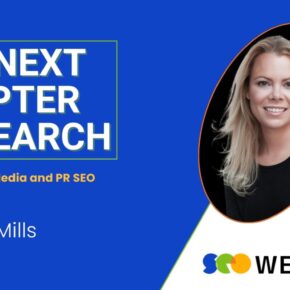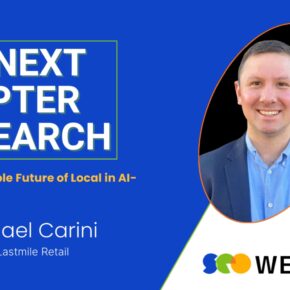
About Greg Gifford
Greg is an experienced Local SEO consultant specializing in the automotive industry. An experienced conference speaker, his movie-themed slide decks are always audience favorites.
Specialties include:
Search Engine Optimization, Local SEO, Local Search Optimization, Social Media Marketing, E-mail Marketing, Web Analytics, Web Design, Graphic Design, and Photography
Greg's SEO Week Session
- Title: The 3 Dimensions of Local Search
- When to Watch: Day 3 | Wednesday, Apr 30th | 3:15 pm
- Session Abstract: In this action-packed session, Greg Gifford will walk through the 3 Dimensions of Local SEO – your website, your GBP, and your reviews. He’ll explain the importance of each of the three areas, sharing detailed tactics to help you beat local competitors in the SERPs.You’ll learn about advanced content tactics that will help you expand your local reach to nearby towns, specific tips about optimizing your GBP, and proactive tactics for acquiring more reviews. You’ll also learn advanced content tactics that will help you use UGC on your GBP to create better content that customers (and Google) will love.To cap it all off, Greg will share a link to a customizable Local SEO audit built-in Google Sheets so that you can score the 3 Dimensions for your clients and potential clients.
Transcript
Garrett: Welcome back to The Next Chapter of Search produced by SEO Week and iPullRank. Check it out. End of April in New York City, all of the best, all of the best SEOs in the world are coming. Like this lineup is ridiculous. And we have the man when it comes to local SEO, Greg Gifford is the guy to talk to because he’s like boots on the ground, knows the specific things you actually do. It’s not just theory, like he knows the tactics. He’s the COO at SearchLab. Thanks for joining me, Greg. How you doing, man?
Greg: I’m great, man. I’m excited to talk to you again. It’s been a bit.
Garrett: Dude, it has. I mean, like every conference, you know, you got to find Greg because he’s always having the best conversations. Like you’ll jump in, you’ll see, I’ll see you like talking to someone and you’ll just be surrounded in a circle talking SEO. I’m really excited specifically about local SEO and your perspective of, because everything’s changed so much in the past few years and local’s kind of like the more changes, the more stays the same. What’s your perspective on the state of local SEO right now?
Greg: Oh, geez. Um, I think the interesting thing is, you know, years and years ago, local SEO was like the redheaded stepchild of SEO. It was like one room of one small track at an entire multi day conference. And now you’ll have like entire days or multiple days for local SEO because…I still think the biggest problem is that most people that need it don’t know that they need it and they do regular SEO instead of local. But like you said, a lot of the basics are still there. Like things that I talked about 10 years ago in conference presentations, 80% of that stuff is still true.
The stuff that’s changing is, you know, AI starting to encroach. Are we going to see it? I haven’t seen it a lot in the localized transactional stuff yet, but they’re starting to encroach there. Um, the biggest change really though, is Google trying to fight spam and fake listings and they’ve dialed it up way too far and a lot of legitimate businesses are getting suspended lately. So that’s like the biggest kind of issue and big thing going on in local is all the suspensions.
Garrett: That’s really interesting. And that’s, that’s my big fear too, is all the false positives. I’m really curious, it’s not necessarily what you’re going to speak about, but you guys at SearchLab just spent like the last two years studying over 1,600 Google business profiles in the automotive vertical.
Greg: Yeah, we did.
Garrett: What was the most interesting thing that you found from that?
Greg: Well, you know, it was, it was the whole purpose of the study wasn’t to try to say, “Hey, this is a ranking factor and it matters more than others,” because statistically, how do you really do that reliably? Right? Because there’s not enough data out there that you can really, statistically say this thing’s more important than this. So, we took a different approach. We studied these business profiles for 1,600 plus car dealerships across two years to see if the data backs up what everyone assumes and agrees best practices are. So, for instance, if you choose the right primary category, does that mean you’re going to be better than guys that don’t?
So, we did it actually three different verticals. We’ve only published the auto dealer one. We’re about to publish the lawyer one, but we did it for car dealers. We did it for personal injury attorneys, because personal injury attorneys tend to be the most SEO forward and most aggressive with local SEO, and then we did it with cannabis dispensaries because they can’t do paid search; the only marketing they can do is SEO. So, we wanted to kind of compare those, but within each vertical we have a section of, all right, this is just industry averages. So, across these profiles all over the country, here’s the average number of reviews, the average response time, average number of photos, all these kinds of things. And then we compare position number one in the map pack to position number 10, which, you know, a lot of people think the map pack is just three, but when you click more locations, it goes to the local finder and shows you everything. So, we actually pulled data on one through 20 in all these cities. And so, we compare one to 10 and like, if you’re doing something right, you should be at number one versus the guy at number 10 doing things wrong. And I color coded everything. So, some of the things that we tracked are ranking signal. Some of them we know don’t affect ranking, but they’re important for conversions.
So, we’ve got green and blue to delineate between, Hey, this influences ranking. This doesn’t, but it’s important. And then in the comparison section, I added in red where something didn’t match. Like you would assume if you have more links, you’re going to rank higher. Now obviously there’s more nuance to that, but just in general, if you’re doing link building, you probably have more links. You’re going to rank higher. That actually didn’t hold true when we compared number one to number 10, number 10 had more links, which we thought was interesting. But when you dig into the data, it’s that I think it was Autonation. I don’t remember who, but it was a big, big, massive group of dealerships and they have their own internal SEO team and they’re going after the wrong metric. They’re going for the total number of links, not the unique number of websites. So, all of their sites have like 4.6 million links from like 600 websites. So, if I took that one guy ranking number 10 out, that 4 million goes away. And then the numbers flip back to what you would expect that the guys at number one have more. I don’t want to like make the number say what I want them to say.
So, there’s a couple of things that didn’t match up and it was always because there was a couple of outlying situations where if you really took those numbers out, then okay, then things align with expectations. But review response time was pretty crazy. Sometimes it’s like up to a week to respond to reviews. There’s a lot of profiles where the average age of the last uploaded photo from the business owner is like six or seven years of time. So, a lot of people really approach it as a set it and forget it. They just upload their stuff and they optimize it and don’t touch it again.
Garrett: That is so fascinating because there are a bunch of levers that you can pull. Obviously, you’re always tied within the proximity, you know, quandary that is local SEO of how strong of a ranking factor just where you are on the map. But like all these other things to test. And then to your point, when SEO, we always talk about tying it to revenue, which is those levers you can pull that aren’t necessarily going to impact your rankings, but ultimately will impact how many sales you make, how many people buy. That kind of leads into how are you thinking about what you’re going to be presenting at SEO week and why should people come and see all these gems that you just drop in terms of like the what to do?
Greg: Oh, well, you know, I, I feel like I haven’t really chatted with Mike about the specifics of what I’m going to talk about, but we did talk about it a little bit on the boat in San Diego at the boat party. And I think I’m going to go a little more advanced this time. A lot of times I go pretty basic, but this time I think I might go a little bit more advanced and talk about some really cool things that you can do.
There’s some research that Joy Hawkins did about the default order of reviews. So, you know, when you first go to a reviews on a Google business profile, there’s the default order before you click the filter to see newest or best or worst. She did some research about things that make reviews stick there longer, and then you can kind of take a leap and add all the things that she found together to bury bad reviews from that default really quickly. So that’s a really cool advanced tip that we’ve been using a lot lately. That’s really successful.
I’m doing a talk at SMX Munich about using user generated content on your Google business profile for content ideas. And I’m really enjoying what I’m putting together there. It’s basically saying, look at your reviews and see what people are talking about and the terms that pop up all the time. Make sure you have those same terms on your website. So, if it’s good reviews saying certain things over and over, make sure you have that very clear and obvious on your website. Or if it’s bad reviews saying the same thing over and over, do you not have the right answer on your website or what you have on your website isn’t clearly matching expectations? What do you need to update? And I don’t think a lot of people dig that deeply. I think people just kind of look at their reviews and don’t see the gold mine of opportunities for things that you can write.
And then, you know, look at your competitors reviews. Look at the Q and A section on your Google business profile where people are asking questions both for you and your competitors. So, I’ll talk a lot about that. I have a really cool local SEO audit tool that we’ve built in Google Sheets. That’s a quick little mini tactical audit that we found very successful. So, I’m sure I’m going to share some information about that as well. So, it’ll be kind of a quick little local SEO advanced masterclass. It should be really fun.
Garrett: Dude, I love that, especially for like the enterprise attendees who have located like all these nationwide locations, like next leveling up is so critical. And you know, we know each other going way back when I was working in a review software company where, you know, I am hyper aware of the value reviews. I remember looking at not just the default reviews, but what snippets were pulled out because it always has those three snippets. And like, depending on your review score, it’d be like too good and one bad. Or sometimes if it was kind of crappy, two bad. It’s like, how do you actually adjust that and asking for those reviews? So interesting, dude. Everyone should come to see what sort of research you’re doing.
And then my next big question is like, what direction? Like, I feel like local SEO has always gotten the short end of the stick by Google, you point out about spam and the false positive. What do you think is going to happen going forward? Do you think it’ll be more of the same? Do you think we’ll see more AI organized local results? What’s going to happen?
Greg: I think for sure Google is looking at things they can do with AI to streamline the local business interface. Like you can already have an auto generated AI description of your business. I think they’re trying to look for ways that they can help businesses make their profiles better because anything that you do to make your profile better makes it more engaging. And if more businesses do that, more people stay on Google. So, Google has a vested interest in keeping people on Google. So Google makes more money off of ads. So that’s why they’re kind of looking at these things. But they don’t want to invest a lot of internal like FTE seats to do these things. So, I think they’re looking at AI as ways to enhance profiles for people that don’t know enough about how to do it. And then if you know enough about how to do it, you can obviously change those things.
I think AI is coming for local results. We don’t really see it much yet. Currently what we do see it’s either really, really, really hallucinated or it’s just pulling exactly what you’d see in the map back in the same order anyway. So, there’s no difference there. But I think more and more businesses are going to realize that local is what they really need to be doing. And I think the biggest thing moving forward is Google is aggressively trying to fight spam both in the form of fake business profiles and in the form of fake reviews.
So, I think business owners and marketers should be ready for that onslaught of updates to make it harder and harder and harder to actually get verified and stay verified because Google’s trying to crack down on all the fake stuff. And there is a lot of fake stuff. And does it suck when you’re caught as a false positive? Sure. But the alternative is we leave a crap ton of spam out there that’s bad for everybody. So, I think if you’re just prepared for it, you know what to expect. It won’t be the headache that it is now.
Garrett: One final question is for the longest time, I think for local SEO being an individual mom and pop small business, you had this advantage against enterprises where you really, you know, invested, you understood. At the enterprise level, do you think Google is going to – do enterprises continue to just lean on their brand awareness and visibility? Or are there more and more tools…because like Google’s never really given enterprises the tools to take advantage of the local space.
Greg: I mean, there’s tools out there, but they’re not Google tools. It’s other software things that have been built. But yeah, local is massive for enterprise. You know, you think a little mom and pop, you make a tweak to a business profile, and it maybe gives you a little bit of a boost, or maybe it doesn’t. But at the scale of thousands of locations, looking at that and going, oh, we don’t have this category selected, and we should and you select that category across thousands of locations, you get a half a percent lift across 1,000 locations. And that’s a massive difference for an enterprise business where a half a percent lift to a small business that’s only getting 150 to 200 visits a month. They’re not even getting an extra visit.
And there’s a lot of enterprise businesses out there that they really care more about the GBP side of it than the website side, because that’s what it’s all about is getting found in that local area. And so, finding the right tools to help with that, or the right information and know the things you should be looking at will be a game changer for enterprise.
Garrett: Huge is the opportunity cost. It’s like if you choose not to pay attention to it, you’re missing on so much available money. Awesome, dude. Everyone wants to find Greg wants to hear amazing local SEO tidbits. You got to come and chill with us. April 28, New York City SEO week. It’s going to be unbelievable. Lots of great parties. Excited to see you there, Greg. It’s going to be fantastic.
Greg: Like projection mapping on the walls and stuff like I’m psyched to see this place.
Garrett: Dude, next level. Okay, catch the next episode. My name is Garrett Sussman. That’s brought to you by iPullRank. We’ll see you soon.



